Father Gordon MacRae: The Heart of a Priest in Hindsight
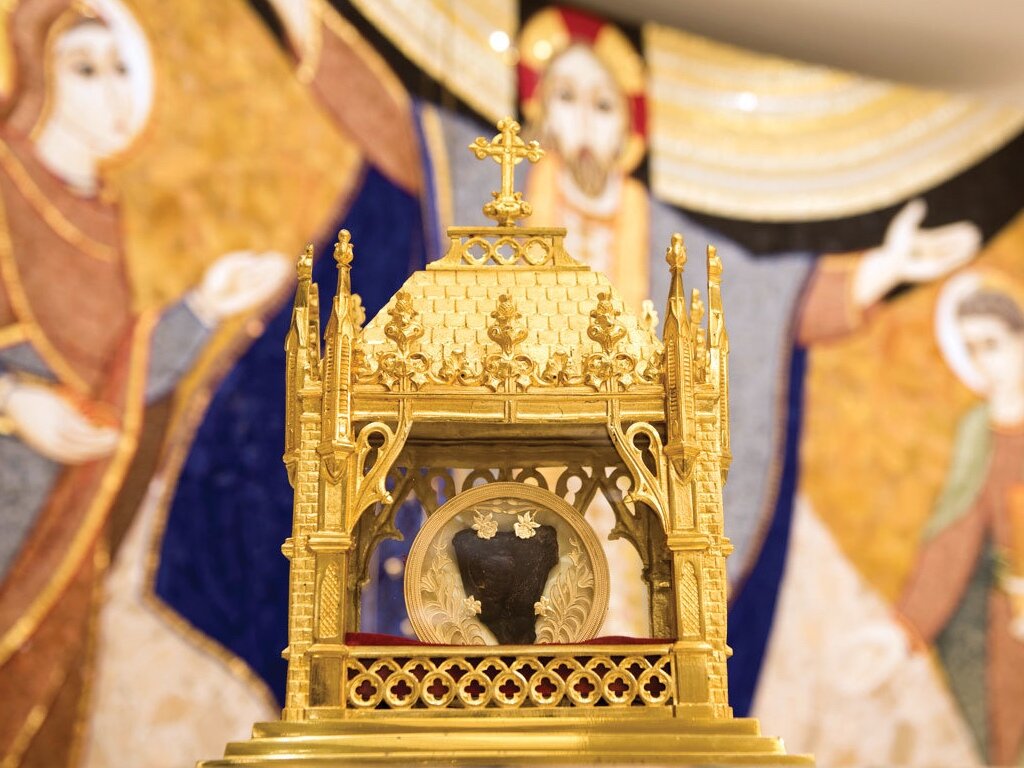 St John Vianney, the Curé of Ars and Patron Saint of priests, has taken up residence in the heart of a priest in prison during a traumatic time for the priesthood.I have a strange story to tell you, and I am not entirely certain where to begin. It’s a story that I first told to Father Stuart MacDonald, and when I finished there was a long pause before he said, “You MUST tell this to your readers.” Well, that was interesting. I never really thought of you as MY readers before. I’ll have to let that sit for a bit.This story is about the future of These Stone Walls. It seems now to surround and frame my tumultuous life as a priest that began with my ordination on June 5, 1982. I am not sure where to begin so I’ll start in the here and now and work backwards.As many of you know, Father George David Byers, a Missionary of Mercy appointed by Pope Francis, has been serving as editor for the publication of These Stone Walls. Each week, I mail my typed post to him in North Carolina for scanning, formatting and editing so it can be published. Without him, TSW would end.A few months ago, because of being a Missionary of Mercy, it was requested of Father Byers to serve as a confessor and spiritual director at the pilgrimage destination of Ars in the East of France commencing in September, 2019. The Catholic parish at Ars is a globally visited shrine in honor of its most famous priest, Saint John Vianney, the Curé of Ars, whose legendary faith and works restored Catholic France after the French Revolution.How this will work out is by no means a sure thing. His bishop may encourage his priest to remain in his current assignment where he is very much needed. The next month will give us an answer. If the answer is that he may go, I believed TSW would end.So throughout Lent this year, I was preparing for that end. I had no one in the United States with the time and computer and editing skills needed to assume these tasks. TSW will be ten years old in early August, so I saw the writing on the wall and concluded that this would be a natural end.August 14, the Feast Day of our. Patron Saint, Maximilian Kolbe, is on a Wednesday this year - our traditional post day - so I thought I would write my last post in his honor. It seemed fitting because my first post on These Stone Walls in the summer of 2009 was “St. Maximilian Kolbe and the Man in the Mirror.”I confided this to a few friends who were alarmed by it. For my part, I can no longer imagine being behind these stone walls without writing. But it seems that the Communion of Saints means they are in communion not only with us, but with each other. While writing my Holy Week post this year, “Waking Up in the Garden of Gethsemane>,” I received a beautifully handwritten letter “out of the blue” from a reader in the New York area.The reader has a carefully guarded internet footprint, which I respect, so I will refer to her as Esther. She wrote that she stumbled upon These Stone Walls just a week earlier while searching “Benedict XVI on Saint Joseph” which took her to one of my posts. Here is an excerpt of her letter.
St John Vianney, the Curé of Ars and Patron Saint of priests, has taken up residence in the heart of a priest in prison during a traumatic time for the priesthood.I have a strange story to tell you, and I am not entirely certain where to begin. It’s a story that I first told to Father Stuart MacDonald, and when I finished there was a long pause before he said, “You MUST tell this to your readers.” Well, that was interesting. I never really thought of you as MY readers before. I’ll have to let that sit for a bit.This story is about the future of These Stone Walls. It seems now to surround and frame my tumultuous life as a priest that began with my ordination on June 5, 1982. I am not sure where to begin so I’ll start in the here and now and work backwards.As many of you know, Father George David Byers, a Missionary of Mercy appointed by Pope Francis, has been serving as editor for the publication of These Stone Walls. Each week, I mail my typed post to him in North Carolina for scanning, formatting and editing so it can be published. Without him, TSW would end.A few months ago, because of being a Missionary of Mercy, it was requested of Father Byers to serve as a confessor and spiritual director at the pilgrimage destination of Ars in the East of France commencing in September, 2019. The Catholic parish at Ars is a globally visited shrine in honor of its most famous priest, Saint John Vianney, the Curé of Ars, whose legendary faith and works restored Catholic France after the French Revolution.How this will work out is by no means a sure thing. His bishop may encourage his priest to remain in his current assignment where he is very much needed. The next month will give us an answer. If the answer is that he may go, I believed TSW would end.So throughout Lent this year, I was preparing for that end. I had no one in the United States with the time and computer and editing skills needed to assume these tasks. TSW will be ten years old in early August, so I saw the writing on the wall and concluded that this would be a natural end.August 14, the Feast Day of our. Patron Saint, Maximilian Kolbe, is on a Wednesday this year - our traditional post day - so I thought I would write my last post in his honor. It seemed fitting because my first post on These Stone Walls in the summer of 2009 was “St. Maximilian Kolbe and the Man in the Mirror.”I confided this to a few friends who were alarmed by it. For my part, I can no longer imagine being behind these stone walls without writing. But it seems that the Communion of Saints means they are in communion not only with us, but with each other. While writing my Holy Week post this year, “Waking Up in the Garden of Gethsemane>,” I received a beautifully handwritten letter “out of the blue” from a reader in the New York area.The reader has a carefully guarded internet footprint, which I respect, so I will refer to her as Esther. She wrote that she stumbled upon These Stone Walls just a week earlier while searching “Benedict XVI on Saint Joseph” which took her to one of my posts. Here is an excerpt of her letter.
“I have read several of your articles, and I am impressed by your enlightening messages, the beauty of the language, and the education on Scripture you give. I have also read enough to see how very difficult it is to write and publish them in your circumstances.”
Esther went on in her letter to tell me that she was born on June 5th, the date of my priesthood ordination, and recently retired as a researcher and tenured professor of computer science ata major university. She had earned a Master of Science in Physics and was well on the way to her Ph.D. when she switched disciplines and earned her Ph.D. in computer science.SAINT JOHN VIANNEY, PATRON SAINT OF PRIESTHOOD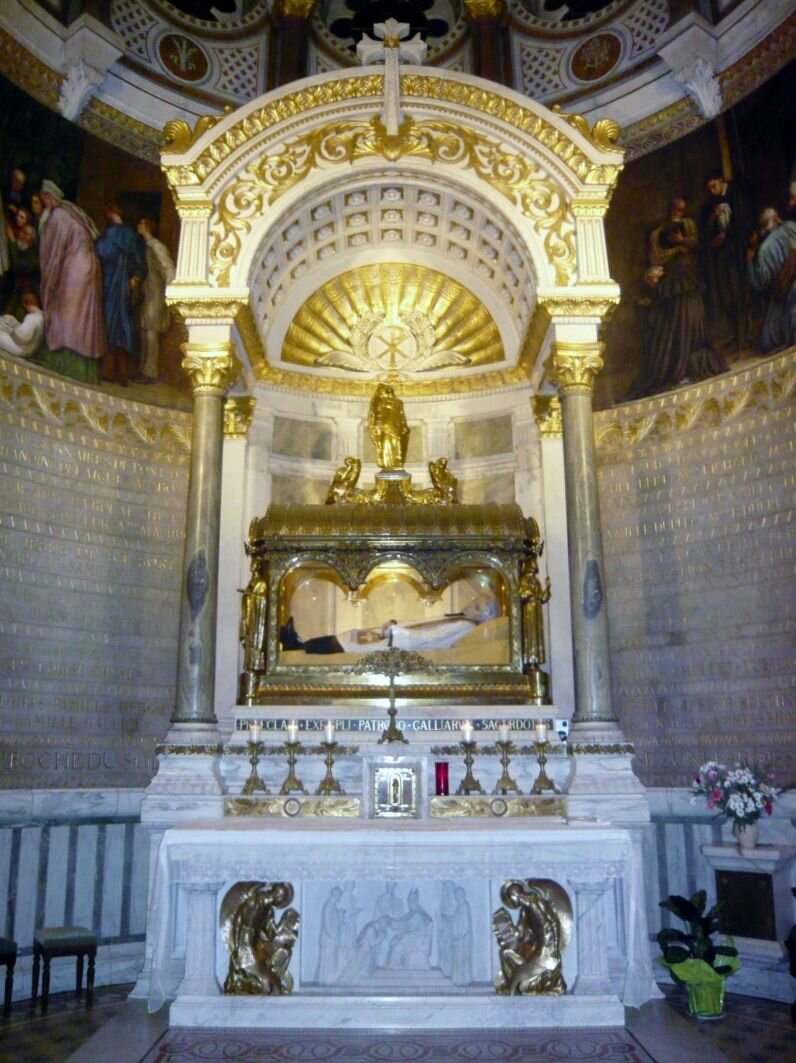 You may have already guessed where this is going. I then wrote back to Esther with my story that TSW may come to an end if Father Byers makes his way to the Shrine of Saint John Vianney, the Patron Saint of priests.Esther responded immediately. She wrote that on the day she defended her doctoral dissertation in computer science, she attended Mass with her mother. She wrote that she asked the saint of the day to pray for the success of her dissertation.It was, of course, Saint John Vianney. Esther wrote that she has long owed him a favor, and would therefore be happy to step in for Father Byers if and when the need arises. In that event,she would then email my completed posts to him where they would be published at the Shrine of Saint John Vianney at Ars.Within a day of receiving that news, I received a letter from TSW reader, Claire Dion in Maine. Claire, who knew none of this story, wrote that the Knights of Columbus are sponsoring an opportunity to support priests in this troubled time through veneration of the Heart of Saint John Vianney being displayed in cathedrals throughout the United States.Claire said the heart would be on display at the Cathedral in Portland, Maine that week. So she told me of her plan to go there for Eucharistic Adoration and veneration before the sacred relic. She said she also planned to bring a photo of me from These Stone Walls to place before the heart of Saint John Vianney in a gesture of uniting my heart to his.Before doing that, Claire snapped the photo of his heart in its reliquary that is atop this post. Claire sent the photo to me via a GTL message on my tablet. It is still there. Three days later was Divine Mercy Sunday. Because of my “Divine Mercy Pilgrimage 52 Weeks with Saint Faustina,” that I wrote about that week, I planned to spend that entire day with EWTN’s coverage at the Divine Mercy Shrine in Stockbridge, MA.I knew that Donna Marie Cooper-O’Boyle and many of our friends from the Divine Mercy Shrine would be among the 17,000 in attendance on that cold and rainy day outside.After Communion, as Pornchai Moontri and I watched and prayed from inside our prison cell, The Heart of Saint John Vianney was elevated that he might bestow his blessing on us. Pornchai popped his head down from his upper bunk and said, “Wow! He sure does get around!”On Divine Mercy Monday, in the prison law library where I work, some of the workers were in the process of spring cleaning ahead of an upcoming inspection. They dragged a dusty box of old discarded books out from under a desk somewhere. As they opened it, a cloud of dust drifted out. “It’s all really old stuff,” one of them said. So I walked over and looked inside the box.At the very top was a 1910 biography of (then) Blessed John Marie Vianney, Curé of Ars honoring his 1905 Beatification by Pope Pius X. I have been reading all about him. He and I were both ordained at age 29, and we both had to overcome many challenges to become priests. So after weeks of being stalked by him, I surrender. He has made his point. Saint John Vianney now joins Saints Maximilian Kolbe and Padre Pio as a Patron Saint of These Stone Walls.EMBARKING ON THE ROAD TO CALVARY
You may have already guessed where this is going. I then wrote back to Esther with my story that TSW may come to an end if Father Byers makes his way to the Shrine of Saint John Vianney, the Patron Saint of priests.Esther responded immediately. She wrote that on the day she defended her doctoral dissertation in computer science, she attended Mass with her mother. She wrote that she asked the saint of the day to pray for the success of her dissertation.It was, of course, Saint John Vianney. Esther wrote that she has long owed him a favor, and would therefore be happy to step in for Father Byers if and when the need arises. In that event,she would then email my completed posts to him where they would be published at the Shrine of Saint John Vianney at Ars.Within a day of receiving that news, I received a letter from TSW reader, Claire Dion in Maine. Claire, who knew none of this story, wrote that the Knights of Columbus are sponsoring an opportunity to support priests in this troubled time through veneration of the Heart of Saint John Vianney being displayed in cathedrals throughout the United States.Claire said the heart would be on display at the Cathedral in Portland, Maine that week. So she told me of her plan to go there for Eucharistic Adoration and veneration before the sacred relic. She said she also planned to bring a photo of me from These Stone Walls to place before the heart of Saint John Vianney in a gesture of uniting my heart to his.Before doing that, Claire snapped the photo of his heart in its reliquary that is atop this post. Claire sent the photo to me via a GTL message on my tablet. It is still there. Three days later was Divine Mercy Sunday. Because of my “Divine Mercy Pilgrimage 52 Weeks with Saint Faustina,” that I wrote about that week, I planned to spend that entire day with EWTN’s coverage at the Divine Mercy Shrine in Stockbridge, MA.I knew that Donna Marie Cooper-O’Boyle and many of our friends from the Divine Mercy Shrine would be among the 17,000 in attendance on that cold and rainy day outside.After Communion, as Pornchai Moontri and I watched and prayed from inside our prison cell, The Heart of Saint John Vianney was elevated that he might bestow his blessing on us. Pornchai popped his head down from his upper bunk and said, “Wow! He sure does get around!”On Divine Mercy Monday, in the prison law library where I work, some of the workers were in the process of spring cleaning ahead of an upcoming inspection. They dragged a dusty box of old discarded books out from under a desk somewhere. As they opened it, a cloud of dust drifted out. “It’s all really old stuff,” one of them said. So I walked over and looked inside the box.At the very top was a 1910 biography of (then) Blessed John Marie Vianney, Curé of Ars honoring his 1905 Beatification by Pope Pius X. I have been reading all about him. He and I were both ordained at age 29, and we both had to overcome many challenges to become priests. So after weeks of being stalked by him, I surrender. He has made his point. Saint John Vianney now joins Saints Maximilian Kolbe and Padre Pio as a Patron Saint of These Stone Walls.EMBARKING ON THE ROAD TO CALVARY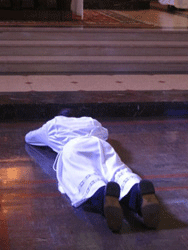 A few weeks ago, I asked Father Stuart MacDonald to write a guest post about his life as a priest in challenging times. His post on “Our Battle-Weary Priesthood” was a heartfelt gem for which I am both grateful and proud to have on These Stone Walls.My path to priesthood had some similarities to Father Stuart’s. No one knew that I had any such inkling. Growing up, I was a cradle Catholic but in name only. My family had only minimal Christmas and Easter Catholic identity. There were times when I needed to pray, but the very notion met only with an empty void.Some people think that priests have all lived sheltered lives in some holy realm beyond the lives of other men. That was not the case with me. I was the second of four children growing up in a single-parent home in the inner city north of Boston. There were many challenges. My father abandoned his family to go find himself when I was twelve in 1965. My mother worked as a house cleaner. She did the best she could, but money and parental guidance were scarce commodities. We were on our own.To help support my family and keep our home, I held a full-time job in a lumber yard during the summers and in a machine shop working 3:00 to 11:00 PM during the school year. I worked as a heavy grinder, with the scars and calluses on my hands still visible to this day. I kept none of what I earned. The notion of sacrifice was not at all foreign to me.I attended public schools, and was just one month seventeen when I graduated from Lynn English High School. In the previous summer, at age 16 in 1969, the world was in a state of shock and chaos. Neil Armstrong walked on the moon. The war in Vietnam raged on and was every high school senior’s dreaded and hopeless destiny.Protesters took to the streets of Boston in viral mob scenes of discontent. The sexual revolution exploded. The Second Vatican Council left in its wake an exodus of confused and heartbroken Catholics. But I was not one of them. Being Catholic meant so little to me up to then.It was in that climate, in the summer of 1969 at age 16, that I was drawn into to the Catholic faith of my heritage. I cannot pinpoint exactly why except to say that I was repelled by the #MeFirst values and rebellions of the 1960s.So mine was a sort of counter revolt. As my peers drifted away from faith, I drifted back into it. Except for a Jesuit uncle at Harvard, there was no support whatsoever in my family for my newfound expression of faith. As the world of my peers screamed out in protest, I went inward, and found there a summons to an unexpected journey.But it seemed far beyond my reach. After high school, I had to work as a machinist, often putting in sixteen hour days, to support younger siblings until they finished school. Five years after high school, I commenced studies at Saint Anselm College on a full scholarship, graduating with honors and a double major in psychology and philosophy.Then I studied toward a Master of Science in Behavioral Science. Accepted for candidacy in the Diocese of Manchester, I commenced four years of graduate school at St Mary Seminary & University in Baltimore, Maryland. There I earned Pontifical degrees in Sacred Theology and a Master of Divinity. I was a “solid-A” student in what was then the most liberal Catholic theological school in the nation.
A few weeks ago, I asked Father Stuart MacDonald to write a guest post about his life as a priest in challenging times. His post on “Our Battle-Weary Priesthood” was a heartfelt gem for which I am both grateful and proud to have on These Stone Walls.My path to priesthood had some similarities to Father Stuart’s. No one knew that I had any such inkling. Growing up, I was a cradle Catholic but in name only. My family had only minimal Christmas and Easter Catholic identity. There were times when I needed to pray, but the very notion met only with an empty void.Some people think that priests have all lived sheltered lives in some holy realm beyond the lives of other men. That was not the case with me. I was the second of four children growing up in a single-parent home in the inner city north of Boston. There were many challenges. My father abandoned his family to go find himself when I was twelve in 1965. My mother worked as a house cleaner. She did the best she could, but money and parental guidance were scarce commodities. We were on our own.To help support my family and keep our home, I held a full-time job in a lumber yard during the summers and in a machine shop working 3:00 to 11:00 PM during the school year. I worked as a heavy grinder, with the scars and calluses on my hands still visible to this day. I kept none of what I earned. The notion of sacrifice was not at all foreign to me.I attended public schools, and was just one month seventeen when I graduated from Lynn English High School. In the previous summer, at age 16 in 1969, the world was in a state of shock and chaos. Neil Armstrong walked on the moon. The war in Vietnam raged on and was every high school senior’s dreaded and hopeless destiny.Protesters took to the streets of Boston in viral mob scenes of discontent. The sexual revolution exploded. The Second Vatican Council left in its wake an exodus of confused and heartbroken Catholics. But I was not one of them. Being Catholic meant so little to me up to then.It was in that climate, in the summer of 1969 at age 16, that I was drawn into to the Catholic faith of my heritage. I cannot pinpoint exactly why except to say that I was repelled by the #MeFirst values and rebellions of the 1960s.So mine was a sort of counter revolt. As my peers drifted away from faith, I drifted back into it. Except for a Jesuit uncle at Harvard, there was no support whatsoever in my family for my newfound expression of faith. As the world of my peers screamed out in protest, I went inward, and found there a summons to an unexpected journey.But it seemed far beyond my reach. After high school, I had to work as a machinist, often putting in sixteen hour days, to support younger siblings until they finished school. Five years after high school, I commenced studies at Saint Anselm College on a full scholarship, graduating with honors and a double major in psychology and philosophy.Then I studied toward a Master of Science in Behavioral Science. Accepted for candidacy in the Diocese of Manchester, I commenced four years of graduate school at St Mary Seminary & University in Baltimore, Maryland. There I earned Pontifical degrees in Sacred Theology and a Master of Divinity. I was a “solid-A” student in what was then the most liberal Catholic theological school in the nation.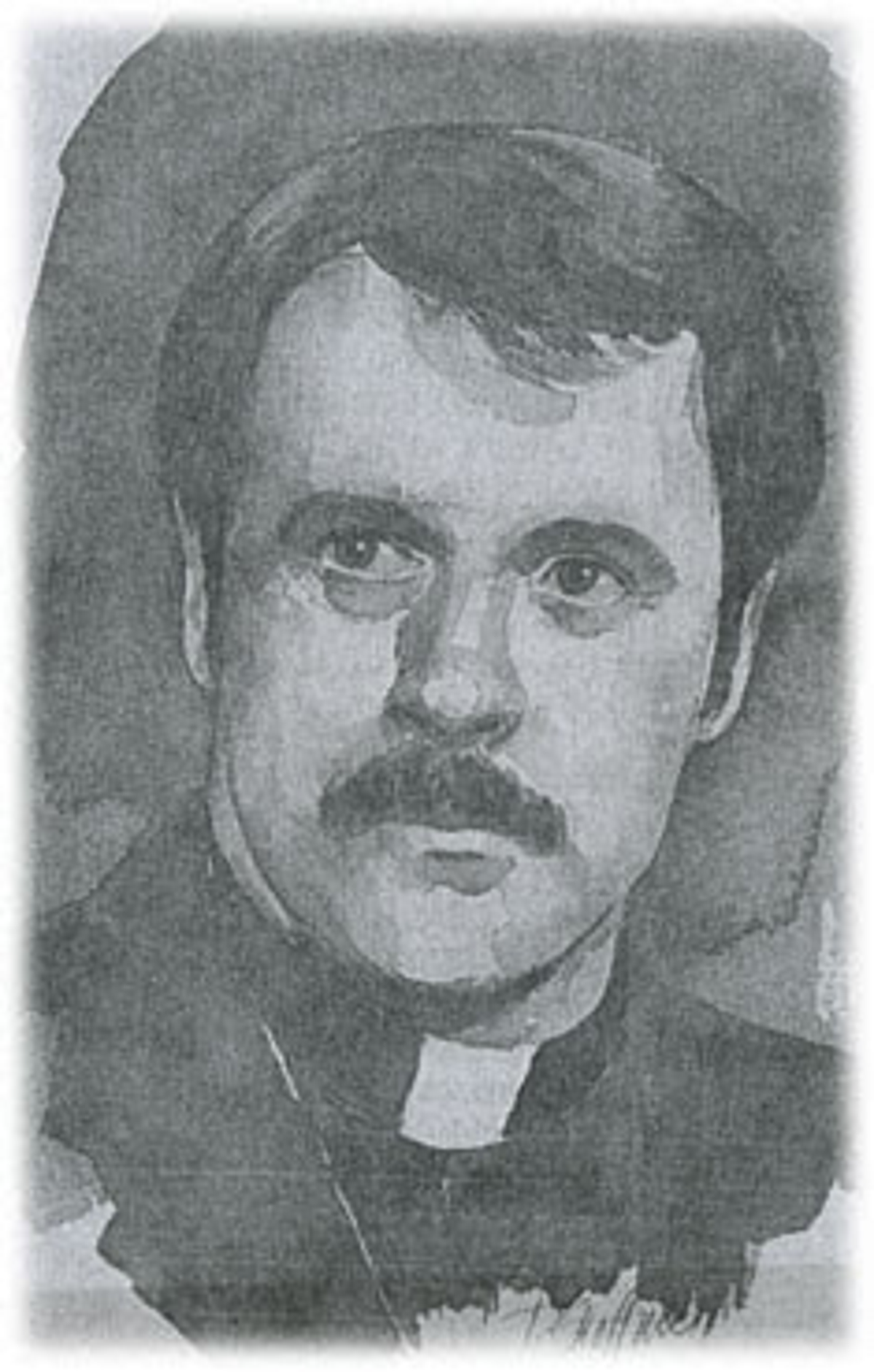 JESUS, I TRUST IN YOUMany of you know the story of my life as a priest. The image atop this segment of this post is one you may have seen before. It was hand drawn by a sketch artist from The Wall Street Journal, replicated from my priesthood ordination photo in 1982. I had not seen it for a long time, but it was recently used for an article on Linkedln by Father James Valladares: “A Catholic Priest Twenty-Five Years Wrongly Imprisoned in America.”I no longer have the original ordination photo. I just wasn’t much for handing out pictures of myself then - or now for that matter. My mother had one, but after her death it disappeared. This rendering from The Wall Street Journal is all that is left of that clueless kid who was the sole priest ordained in New Hampshire in 1982. I showed it to my friend, Pornchai whoobserved, “Well, your hair is gone now, and your mustache is white, but that deer-in-the-headlights look is still there.”I look at that kid in a Roman collar today, and wonder what I would say to him if we could speak candidly. He had no idea of the treachery and spiritual warfare awaiting him as a naive and trusting young priest. Like Father Stuart MacDonald, he had a heart that was open to everyone, never seeing the barbarians at the gate. Like Father Stuart, priesthood took me to Gethsemane,and then a trial before Pilate.Father Stuart wrote in these pages last week that he finds my priestly ministry to be “frightening.” I think he means that I, locked in this unjust imprisonment, make him laugh every time I call. I think he means that grace abounds here even in the midst of evil. I have asked that young man in the image above if he would be ordained if he knew then what he knows now. He said “Yes,” he would, because Jesus remains in him.When Esther first agreed to assist with These Stone Walls, she wrote that she had been contemplating a short prayer based on a Gospel passage (John 15:5):
JESUS, I TRUST IN YOUMany of you know the story of my life as a priest. The image atop this segment of this post is one you may have seen before. It was hand drawn by a sketch artist from The Wall Street Journal, replicated from my priesthood ordination photo in 1982. I had not seen it for a long time, but it was recently used for an article on Linkedln by Father James Valladares: “A Catholic Priest Twenty-Five Years Wrongly Imprisoned in America.”I no longer have the original ordination photo. I just wasn’t much for handing out pictures of myself then - or now for that matter. My mother had one, but after her death it disappeared. This rendering from The Wall Street Journal is all that is left of that clueless kid who was the sole priest ordained in New Hampshire in 1982. I showed it to my friend, Pornchai whoobserved, “Well, your hair is gone now, and your mustache is white, but that deer-in-the-headlights look is still there.”I look at that kid in a Roman collar today, and wonder what I would say to him if we could speak candidly. He had no idea of the treachery and spiritual warfare awaiting him as a naive and trusting young priest. Like Father Stuart MacDonald, he had a heart that was open to everyone, never seeing the barbarians at the gate. Like Father Stuart, priesthood took me to Gethsemane,and then a trial before Pilate.Father Stuart wrote in these pages last week that he finds my priestly ministry to be “frightening.” I think he means that I, locked in this unjust imprisonment, make him laugh every time I call. I think he means that grace abounds here even in the midst of evil. I have asked that young man in the image above if he would be ordained if he knew then what he knows now. He said “Yes,” he would, because Jesus remains in him.When Esther first agreed to assist with These Stone Walls, she wrote that she had been contemplating a short prayer based on a Gospel passage (John 15:5):
“I am the vine, you are the branches. Whoever remains in me, and I in him, he it is that bears much fruit, for apart from me you can do nothing.”
From this passage, Esther wrote she composed a short prayer that came naturally to her: “O remain, Jesus, in me.” She attributes being led to formulate this prayer to Our Lady of Perpetual Help, an icon kept on her computer. Esther wrote that her prayer can be formed into an acronym with Jesus at the center:“O Remain, Jesus, In Me” = O-R-J-I-MThen Esther, who thinks in computer code, wrote, “One might even discover this prayer hidden in a code, such as in the digits on a telephone. The telephone code corresponding to the acronym of the prayer is 6-7-5-4-6 which, she noted, is my prison number.I do not know what to make of that, but I find it both consoling and alarming. When I consider today all that has happened in my life, and what has become of my priesthood, I think of a verse from Saint Paul’s Letter to the Colossians. I have heard it a thousand times, but never really in my heart.My friend Pornchai was the lector at Mass one Sunday in Lent. When he read a passage from St Paul’s Letter to the Colossians, he looked straight at me. He says he was not conscious of doing so, but when he did, I heard that verse for the first time of my life as though the Holy Spirit cast a light upon the nagging questions I have long asked in prison. What has happened to me? What has happened to my priesthood? His answer is hope itself:
“You have died, and your life is now hidden with Christ in God.” (Colossians 3:3)
Editor’s Note: Please honor Father Gordon on his 37th anniversary of priesthood by sharing this post. You may also like these related posts from Father MacRae and These Stone Walls:
- Inherit the Wind: Pentecost and the Breath of God
- Holy Orders in Exile: The Ascension of Persona Christi
- Priesthood in the Real Presence and the Present absence
- Fr. Gordon MacRae & Pornchai Moontri: Captives of Irony Incarnate by Father George David Byers
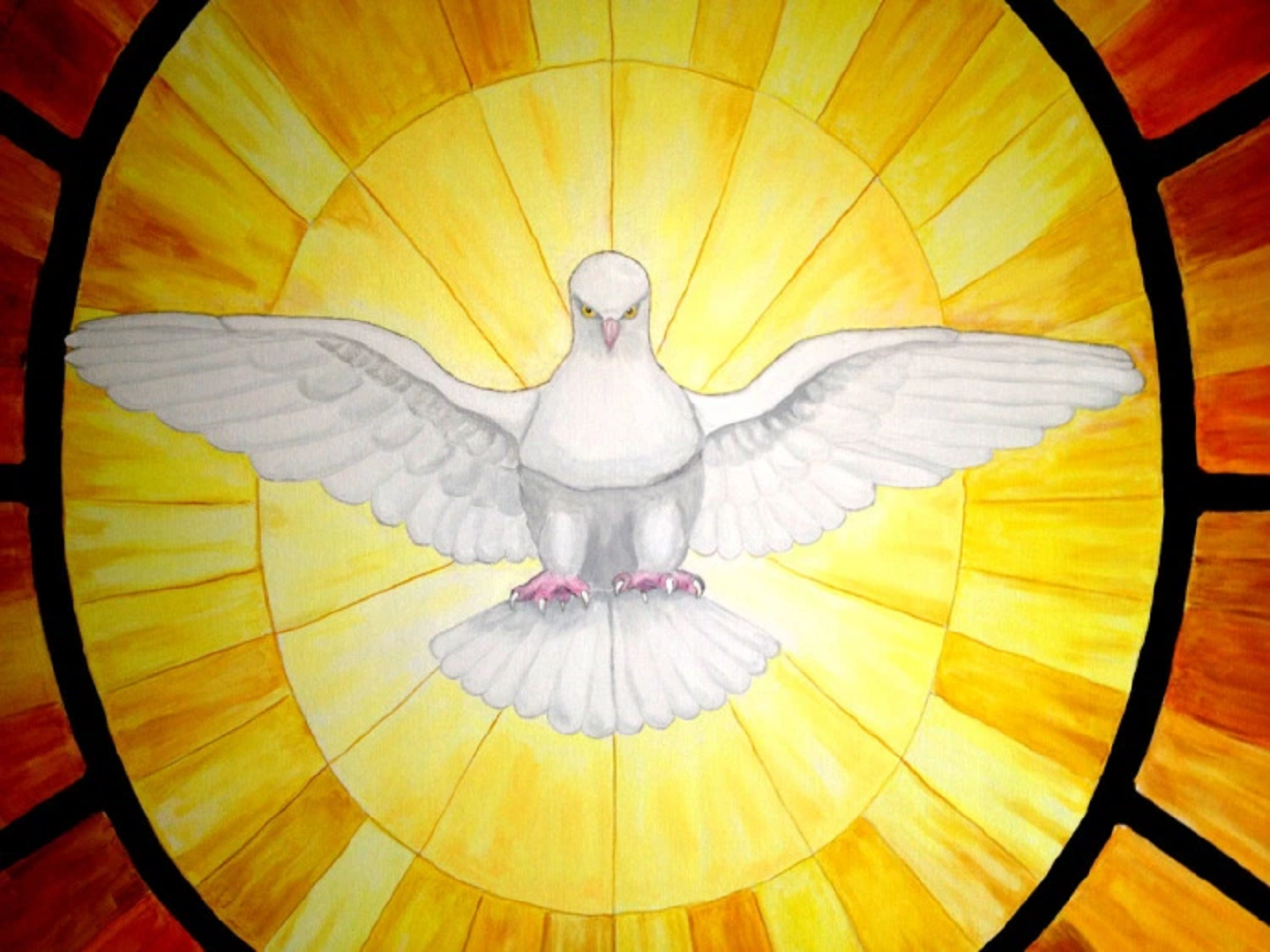 The artist of this very large painting is a reader of TSW, and created this for use as a baldacchino for Holy Souls Hermitage.
The artist of this very large painting is a reader of TSW, and created this for use as a baldacchino for Holy Souls Hermitage.